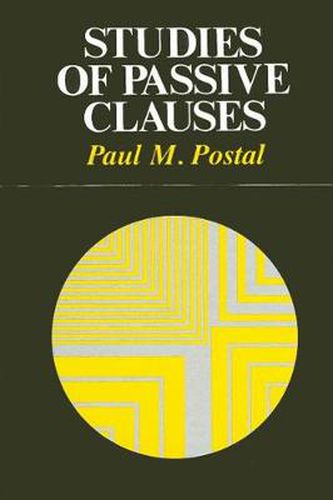Readings Newsletter
Become a Readings Member to make your shopping experience even easier.
Sign in or sign up for free!
You’re not far away from qualifying for FREE standard shipping within Australia
You’ve qualified for FREE standard shipping within Australia
The cart is loading…






In this work, Paul M. Postal supports the universalist theory of language by examining passive clauses. Contrary to a skeptical tradition, Postal argues that passive clauses are cross-linguistically identifiable and characterizable. This study proposes refinements of the analysis of the natural language grammatical category Passive Clause. These refinements include an account of the notion ‘dummy nominal,’ central to the analysis of impersonal passive clauses; additions permitting a proper typology of the major known subtypes of Passive Clause; a generalization permitting application to clauses whose subjects are not earlier level direct objects; and, construction of precise rule concepts to represent restrictions on passive clauses. The passive domain supports the universalist approach in three distinguishable ways: (1) by permitting formulation of otherwise apparently unstatable lawful characteristics of all passive structures; (2) by facilitating statement of language-specific passive constraints holding in diverse languages; and, (3) by allowing uniform statement in grammars of recurrent constraints on passives. Each mode of support is applied to actual cases based on material from more than a dozen languages from English and French to Quiche (Mayan) and Chi-Mwi:ni (Bantu).
$9.00 standard shipping within Australia
FREE standard shipping within Australia for orders over $100.00
Express & International shipping calculated at checkout
In this work, Paul M. Postal supports the universalist theory of language by examining passive clauses. Contrary to a skeptical tradition, Postal argues that passive clauses are cross-linguistically identifiable and characterizable. This study proposes refinements of the analysis of the natural language grammatical category Passive Clause. These refinements include an account of the notion ‘dummy nominal,’ central to the analysis of impersonal passive clauses; additions permitting a proper typology of the major known subtypes of Passive Clause; a generalization permitting application to clauses whose subjects are not earlier level direct objects; and, construction of precise rule concepts to represent restrictions on passive clauses. The passive domain supports the universalist approach in three distinguishable ways: (1) by permitting formulation of otherwise apparently unstatable lawful characteristics of all passive structures; (2) by facilitating statement of language-specific passive constraints holding in diverse languages; and, (3) by allowing uniform statement in grammars of recurrent constraints on passives. Each mode of support is applied to actual cases based on material from more than a dozen languages from English and French to Quiche (Mayan) and Chi-Mwi:ni (Bantu).